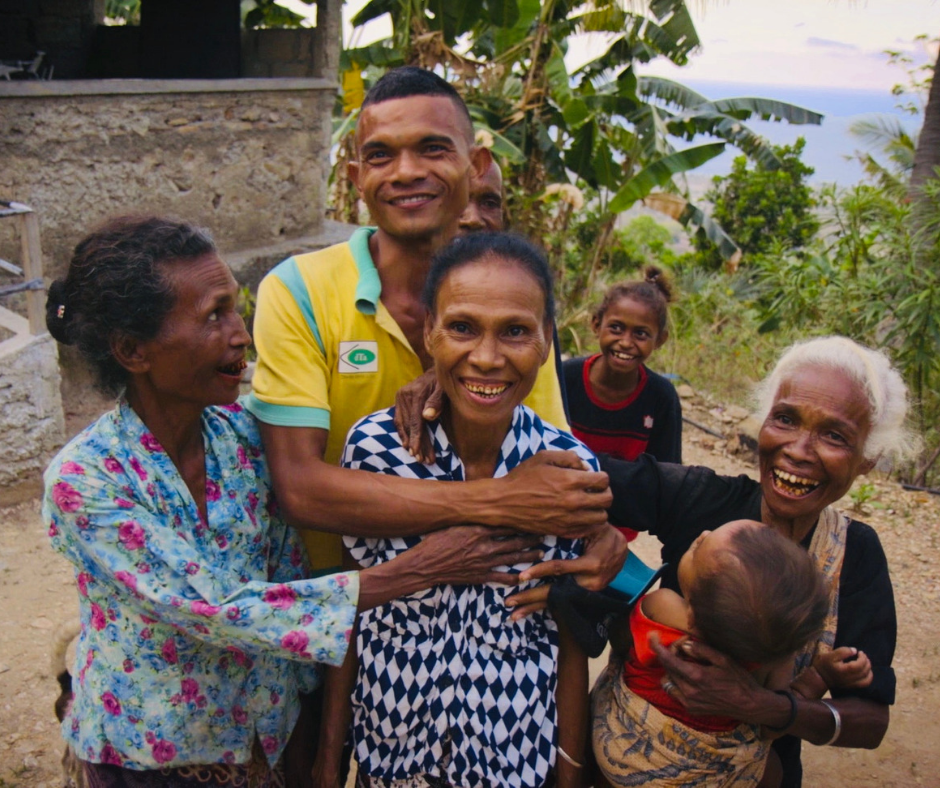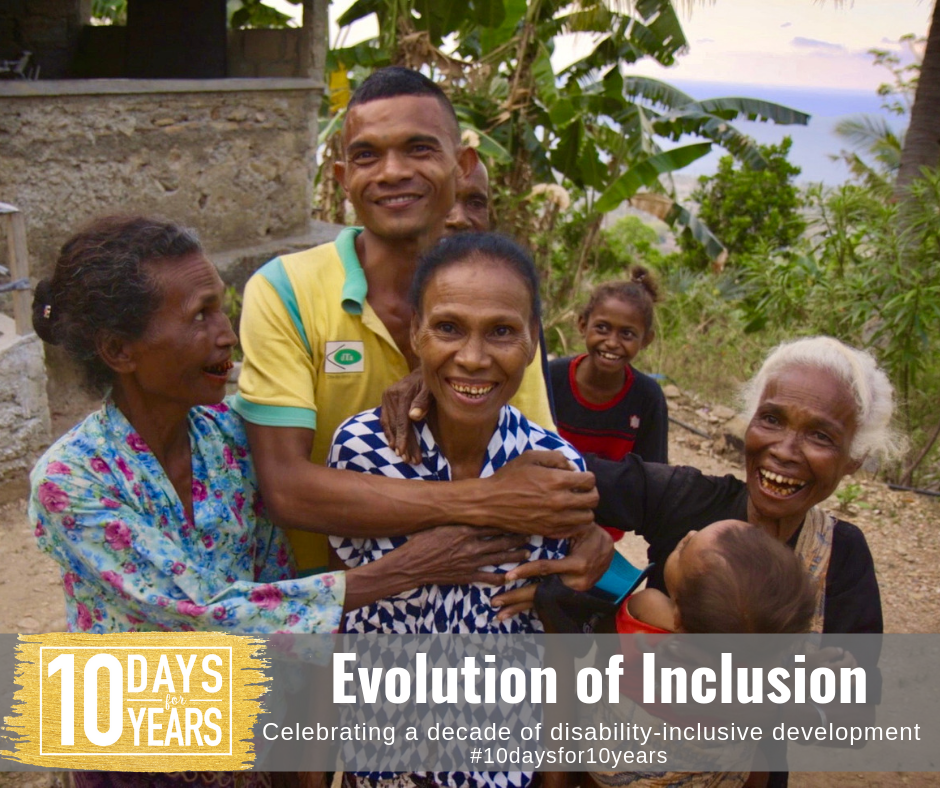Evolution of Inclusion: from optional to integral in water, sanitation and hygiene
Globally and historically, a number of the world’s greatest developmental leaps have built upon safe and sustainable access to water, sanitation and hygiene. But for many people – particularly people with disabilities – in low- and middle-income countries, access remains inequitable and the benefits are not fully shared. For example, an elderly man may have difficulty using a squat toilet; a teenager who uses a wheelchair may not be able to access a public toilet alone; walking to collect water may be unsafe for a women who has difficulty seeing and she relies on others to provide her water.
Despite access to water, sanitation and hygiene (WASH) being a human right and fundamental to overcoming poverty, it was scarcely mentioned in DFAT’s first Development for All: Towards a disability-inclusive Australian aid program 2009-2014. There was some recognition that water supply and sanitation are priorities for infrastructure development, however the strategy primarily recognised WASH as critical for preventing impairments such as avoidable blindness.[1] DFAT’s second strategy, Development for All 2015-2020, demonstrates a clear evolution in approach: it recognises accessible WASH as a key issue compounded by ‘social isolation and taboos’; highlights the role of WASH in alleviating poverty and fostering ‘increased dignity and self-reliance for people with disabilities’; and makes tangible commitments to include people with disabilities in WASH design and educational opportunities.[2]
This evolution has also been reflected in the Australian aid program’s flagship WASH initiatives. The Civil Society WASH Fund, which ran from 2013 to 2018 with total funding of AUD $103 million, did not specifically name disability inclusion as one of its six intended outcomes. However, its overall focus on reaching ‘the poor and vulnerable’ saw 73,000 people with disabilities (out of a total 5.31 million people) reached by improved WASH services.[3]
When the Civil Society WASH Fund concluded, it was superseded by the new DFAT flagship program for WASH investment, the Water for Women fund. The fund commits AUD $110.6 million over five years from 2018 to 2022 for WASH interventions. Although the intended outcomes for Water for Women focus primarily on health, gender equality and wellbeing outcomes, it integrates a strong social inclusion framing, with disability inclusion explicit throughout and a focus on Sustainable Development Goal 6’s ambition of universal access for all marginalised communities to water and sanitation.[4]
This increasingly intentional approach reflects the pattern set out by DFAT’s Development for All strategies and emphasises the value that such strategies can have on guiding major investments.
However, this change also builds upon clear program evidence which demonstrates that disability-inclusive approaches are effective in reaching those most often left behind.
Under the initial Civil Society WASH initiative, WaterAid Australia’s disability-inclusive WASH project in Timor-Leste proved to be transformative. In Timor-Leste, as in many places around the world, people with disabilities have difficulties accessing water and sanitation due to inaccessible and mountainous terrain; poorly-designed toilets and water stations; and hygiene promotion methods inaccessible for people with different disabilities. When people with disabilities are left out of community WASH processes, it risks increasing stigma, shame and negative attitudes towards them.
To overcome these barriers, WaterAid established a partnership with Timorese disabled people’s organisation Raes Hadomi Timor Oan (RHTO) and included technical disability inclusion support from CBM Australia. WaterAid has worked to integrate disability inclusion at all levels, from organisational strategic planning to mainstreaming disability inclusion into WASH processes and services. This includes surveying and planning, demonstrations and awareness-raising, and providing support and referrals.
As a result, WaterAid staff and partners began gathering rigorous baseline data about experiences of disability; to engage directly with people with disabilities to ensure that their situations and needs are understood, targeted solutions are developed, and their views are recognised; and to share lessons with government to influence wider systems.[5]
The success of WaterAid’s approach, and the successful partnership with a disabled people’s organisation, under Civil Society WASH has seen it continued through Water for Women. WaterAid and RHTO have now been collaborating for a decade, with no sign of slowing. Most recently, they have continued to work in partnership to develop accessible infrastructure guidelines, develop resources to facilitate ongoing community-based learning about disability inclusion, integrate disability inclusion into public campaigns, and deliver training.[6]
In programs and in strategies, the past decade of commitment to disability-inclusive water, sanitation and hygiene has yielded dramatic results. Understanding of the importance of accessible and inclusive WASH has seen this approach evolve from optional to integral, with deeper commitment to empowerment. Continuing to build the momentum leveraged through the first and then second Development for All strategies, and from Civil Society WASH through to the Water for Women Fund, all future strategies and initiatives in disability inclusive WASH must be cross-cutting, intentional and upholding human-rights principles in their commitment to leaving no one behind.

Caption: Fatima (center), who uses a prosthetic leg, has faced barriers to collecting water from the river near her village in Timor-Leste. After meeting with WaterAid staff who received disability-inclusive development training from CBM Australia, Fatima was included in community decision-making processes and was able to convince her community to relocate an accessible water point closer to her home. Copyright: CBM Australia.
Information and images used in partnership with Water Aid Australia and CBM Australia.
References
[1] Australian Agency for International Development, 2008. Development for All: Towards a disability-inclusive Australian aid program 2009-2014. AusAID, Canberra. p. 24.
[2] Department of Foreign Affairs and Trade, 2015. Development for All 2015-2020: Strategy for strengthening disability-inclusive development in Australia’s aid program. DFAT, Canberra. p. 19-20.
[3] Civil Society Water, Sanitation and Hygiene Fund, 2018. Overview of Fund Achievements. Available from www.cswashfund.org/sites/default/files/Overview%20of%20the%20Fund%20Achievements.pdf.
[4] Department of Foreign Affairs and Trade, 2018. Water for Women: Improving the health, equality and wellbeing of Asian and Pacific Communities. DFAT, Canberra. p. 3.
[5] WaterAid Australia, 2017. Learning Note: Disability-inclusive WASH Programing in Timor-Leste. p. 2.
[6] Water for Women Fund, Disability-inclusive WASH in Timor-Leste. Available from www.waterforwomenfund.org/en/project/disability-inclusive-wash-in-timor-leste.aspx.
Sign up to receive the daily campaign article:
By signing up you will receive a daily email from the 10 days for 10 years campaign between 29 April to 10 May 2019.
10 days for 10 years
In partnership with CBM Australia and other ADDC partner organisations, the 10 days for 10 years campaign runs from 29 April to 10 May 2019. The campaign is celebrating the achievements in disability-inclusive development (DID) within the Australian aid sector, particularly those led or made possible by Australian aid under the first and second Development for All strategies. Articles will be released daily here on the ADDC website.
Follow the campaign via the hashtag #10daysfor10years and follow @ADDCnews on Twitter, Facebook and LinkedIn.
- 10 days for 10 years
- Day 1 – A Legacy of Leadership
- Day 2 – Beyond the Mainstream
- Day 3 – Inclusion at the Intersection
- Day 4 – Disabled People’s Organisations Leading Change
- Day 5 – Recognising Diversity within Disability
- Day 6 – Reporting from the Shadows
- Day 7 – Volunteering for Inclusion
- Day 8 – Evolution of Inclusion
- Day 9 – Education for All
- Day 10 – Building on Success

